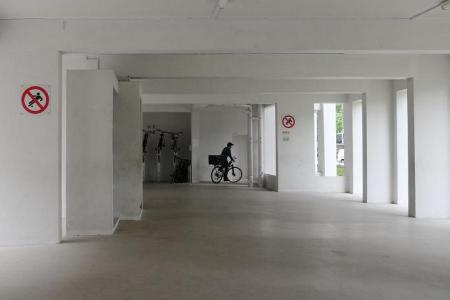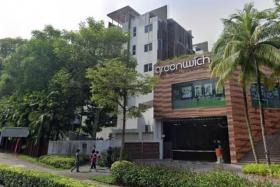27 cases of temporary closure, restricted use of common spaces after in 3 years
There have been 27 cases of town councils temporarily closing or restricting the opening hours of recreational facilities in Housing Board estates in the past three years due to complaints from residents on issues like noise.
Giving these figures in a written answer on Feb 5 to a parliamentary question from Mr Alex Yam (Marsiling-Yew Tee GRC), Minister for National Development Desmond Lee said this move is a last resort when disruptive behaviour by inconsiderate users of the facilities persists, even after advisories have been put up and grassroot leaders have advised users.
Restricting the use of facilities at specific hours, he said, is done by adjusting the timing of the lighting at the facilities or locking up the facilities at night.
Town councils may also seek assistance from the police and other government agencies like the National Parks Board and the National Environmental Agency (NEA) if the disruptive behaviour persists, he said.
A few public amenities across Singapore were closed in recent months over noise complaints in residential estates.
A void deck in Woodlands Ring Road was barricaded temporarily by Sembawang Town Council in November 2023 after residents complained about schoolchildren playing and shouting.
A month later, a street soccer court in Bedok North was temporarily closed in response to reports of “groups of inconsiderate street soccer court users” creating noise late into the night.
Separately, Minister for Law K. Shanmugam said in a written reply to Ms Ng Ling Ling (Ang Mo Kio GRC) that the Government is looking at making mediation mandatory for certain cases of disputes, as part of its review of the Community Dispute Management Framework.
If mediation is made mandatory, frontline officers could step in and mandate mediation for certain types of community disputes, like cases that are long-drawn or escalated between neighbours.
He said: “We are also looking at mandating re-mediation for cases where voluntary mediation was previously attempted and parties arrived at an amicable resolution, but the dispute resurfaces later.”
“With the history of an amicable resolution through mediation, there is value in mandating mediation for such cases.”
Mr Shanmugam said the Government is also studying ways to address concerns that come with mandatory mediation.
Some concerns raised during public engagement include the risk of potential retaliation, and abuse by those insisting on mediation without genuine intent to resolve the dispute, he said.
In the last three years, less than 30 per cent of applications at the Community Mediation Centre involving disputes between neighbours had proceeded to mediation. For cases that proceeded to mediation, more than 80 per cent reached an amicable resolution.
More details on the proposals to introduce mandatory mediation for suitable cases will be shared later, said Mr Shanmugam.
Get The New Paper on your phone with the free TNP app. Download from the Apple App Store or Google Play Store now



